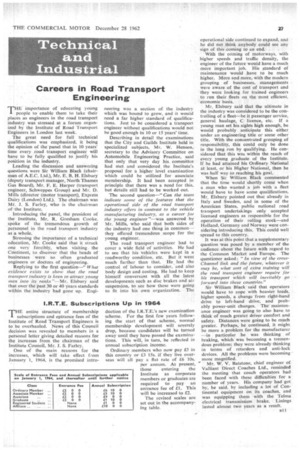I.R.T.E. Subscript ions Up in 1964 T HE entire structure of
Page 29

If you've noticed an error in this article please click here to report it so we can fix it.
membership subscriptions and entrance fees of the Institute of Road Transport Engineers is to be overhauled. News of this Council decision was revealed to members in a personal letter giving detailed reasons for the increases from the chairman of the Institute Council, Mr. J. S. Farley.
One of the main reasons for the increases, which will take effect from January 1, 1964, is the promised intro duction of the I.R.T.E.'s new examination scheme. For the first few years following the start of that scheme, normal membership development will severely drop, because candidates will be turned away until they have passed the examinations. This will, in turn, be reflected in annual subscription income.
Ordinary members who now pay £5 in this country or 1.3 15s. if they live overseas will all pay a flat rate of £6 10s. per annum. At present, those entering the Institute as corporate members or graduates are required to pay an entrance fee of £1. This will be increased to £2.
The revised scales are set out in the accompanying table. operational side continued to expand, and he did not think anybody could see any sign of this coming to an end. .
With the coming of motorways, with higher speeds and traffic density, the engineer of the future would have a much more important job. His standard of maintenance would have to be much higher. More and more, with the modern grouping of businesses, managements were aware of the cost of transport and they were looking for trained engineers to run their fleets on the most efficient, economic basis.
Mr. Elsbury said that the ultimate in the industry was considered to be the controlling of a fleet—be it passenger service, general haulage, C licence, etc. If a young man set his sights high enough, he would probably anticipate this either. under an engineering title or some other title. With the concentrated grouping of responsibility, this could only be done in the long run by qualifying. He considered that this was within the reach of every young graduate of the Institute. If he had attained his Ordinary National at least, or his Higher National, then he was half way to reaching his goal.
When Sir William Black commented that the time would shortly come when a man who wanted a job with a fleet would have to have some qualifications, Mr. Elsbury pointed out that already in Italy and Sweden, and in some of the American States, public national road transport undertakings only accepted licensed engineers as responsible for the operation of their rolling stock—and Holland, Germany and Norway were considering introducing this. This could well spread to this country.
It was at this point that a supplementary question was posed by a member of the audience about the future with regard to the Common Market and Europe. The questioner asked; "/n view of the crossChannel link and the future, whatever it may be, what sort of extra training will the road transport engineer require for his transport which will inevitably go forward into these countries."
Sir William Black said that operators would have to cope with heavier loads. higher speeds, a change from right-hand drive to left-hand drive, and probably power-unit changes. The maintenance engineer was going to also have to think of much greater driver comfort and safety. Distances were going to be much greater. Perhaps, he continued, it might be more a problem for the manufacturer —in particular he was thinking of braking, which was becoming a tremendous problem; they were already thinking in terms of retarders and anti-lock devices. All the problems were becoming more magnified. Mr. W. V. Batstone, chief engineer of Valliant Direct Coaches Ltd., reminded the meeting that coach operators had been faced with these difficulties for a number of years. His company had got by, he said, by including a lot of Continental equipment on its coaches, and was equipping them with the Telma electrical transmission brake. Linings lasted almost two years as a result.




















































































